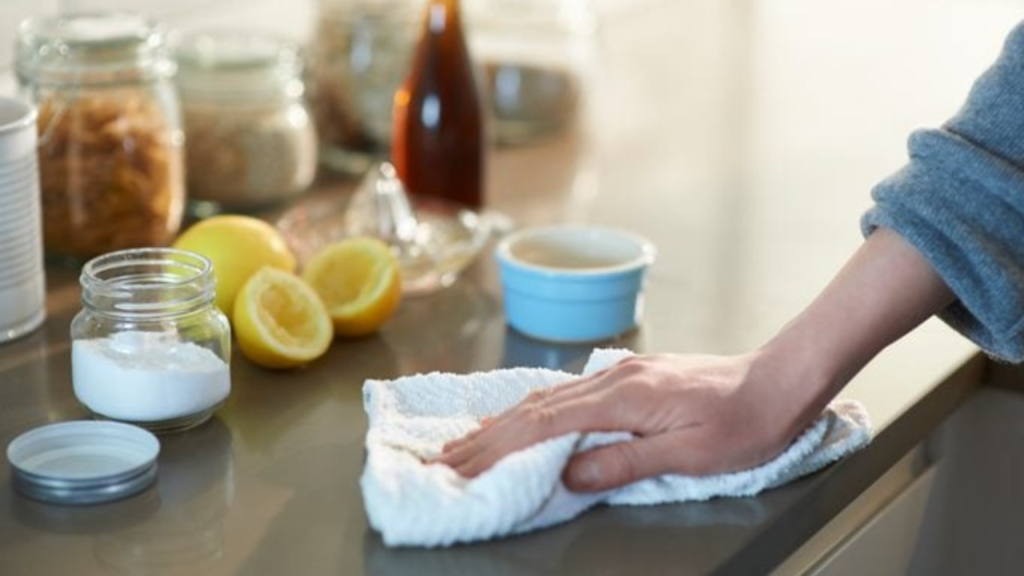
Cleaning doesn’t always require harsh chemicals or expensive cleaning products. In fact, one of the best natural cleaning solutions is something you probably already have in your kitchen: a lemon. This citrus fruit isn’t just for flavoring your water or adding zest to a dish—it’s also a powerful cleaner that can cut through grease, remove grime, and leave surfaces smelling fresh.
Lemons contain citric acid, a natural disinfectant that helps break down tough stains and kill bacteria. Their acidity makes them effective at dissolving mineral deposits, soap scum, and even rust. Plus, lemons are biodegradable, making them an eco-friendly alternative to chemical cleaners. Whether you’re dealing with kitchen messes, bathroom buildup, or cloudy glass surfaces, lemon can be your go-to solution.
Cutting Boards
Your cutting board is one of the most frequently used kitchen tools, and over time, it can absorb odors, stains, and bacteria from food. Instead of using soap and water alone, try a lemon for a deeper clean.
Simply cut a lemon in half and rub it directly over the surface of the cutting board. The natural acidity of the lemon works to sanitize and break down food residue. For an even more effective clean, sprinkle coarse salt—such as sea salt or kosher salt—over the board before scrubbing. The salt acts as an abrasive, helping to lift stains and remove stuck-on food particles.
After scrubbing, let the lemon juice sit for a few minutes to maximize its antibacterial properties. Then, rinse the board thoroughly with warm water and let it air dry. Not only will this method leave your cutting board cleaner, but it will also eliminate lingering food smells, leaving it fresh and ready for your next meal prep.
Removing Hard Water Stains from Hardware
Hard water stains can make faucets and showerheads look dull and dirty, leaving behind stubborn white or chalky deposits caused by mineral buildup. Fortunately, lemon juice provides an easy, natural solution to dissolve these deposits and restore shine to your hardware.
To clean faucets and showerheads, start by cutting a lemon in half and rubbing it directly onto the affected areas. The citric acid in the lemon helps break down calcium and lime buildup. For more stubborn stains, squeeze fresh lemon juice into a spray bottle and apply it generously to the hardware. Let the juice sit for about five to ten minutes, allowing it to penetrate the mineral deposits.
For showerheads, you can soak a cloth or paper towel in lemon juice, wrap it around the fixture, and let it sit for several minutes before wiping it clean. If necessary, use an old toothbrush to scrub away any remaining residue. Once finished, rinse with water and dry with a microfiber cloth to reveal a streak-free shine.
Using lemon juice regularly on your faucets and showerheads not only keeps them looking spotless but also prevents future buildup, making maintenance easier in the long run.
Refreshing Porcelain Sinks
Porcelain sinks are prone to stains from soap, hard water, and everyday use, which can make them look dingy over time. Instead of relying on chemical cleaners, you can restore their brightness using a simple mix of lemon and salt.
Start by sprinkling coarse salt into the sink—this will act as a natural scrubbing agent. Then, take half a lemon and rub it over the surface, focusing on areas with stains or discoloration. The combination of salt and citric acid helps lift grime, remove tough stains, and even tackle rust spots.
Once you’ve scrubbed the entire sink, let the lemon juice sit for a few minutes before rinsing it away with warm water. For extra shine, wipe the sink dry with a clean cloth. This method not only cleans but also leaves a fresh citrus scent behind.
Important Note: While this technique works wonders for porcelain, it is not recommended for stainless steel sinks. The abrasive salt can scratch the surface, and the acidity of the lemon may cause discoloration over time. If you’re cleaning stainless steel, it’s best to use a gentler method, such as diluted lemon juice and a soft cloth.
Deep Cleaning the Microwave
Microwaves often become coated with food splatters and greasy residue, making them difficult to clean. Instead of scrubbing endlessly with soap and water, you can use a simple steam-cleaning method with lemon to loosen grime and make wiping it away effortless.
To start, fill a microwave-safe bowl with about one cup of water. Slice a lemon in half and squeeze the juice into the bowl, then drop the lemon halves in as well. Microwave the mixture on high for about three to five minutes, allowing the steam to build up inside the appliance. The citric acid in the lemon helps break down grease and eliminate lingering odors.
After the timer goes off, let the bowl sit in the microwave for a couple of minutes to allow the steam to further soften any stuck-on food. Carefully remove the bowl (it will be hot) and use a clean microfiber cloth or paper towel to wipe down the interior. Any grime should come off easily without the need for harsh scrubbing.
For an extra disinfecting boost, add a tablespoon of white vinegar to the lemon-water mixture before microwaving. Vinegar enhances the antibacterial properties of the lemon and helps remove stubborn stains. This method not only leaves your microwave spotless but also fills your kitchen with a refreshing citrus scent.
Scrubbing Pots and Pans
Removing burnt-on food and grease from pots and pans can be a frustrating task, but lemon provides an effective and natural way to tackle even the toughest grime.
For everyday grease and residue, sprinkle coarse salt or baking soda onto the surface of the pan. Then, cut a lemon in half and use it as a scrubbing tool, pressing down and rubbing in circular motions. The acidity of the lemon works to break down grease, while the abrasiveness of salt or baking soda helps lift stubborn debris without scratching the cookware.
If the grime is particularly tough, squeeze some lemon juice directly onto the affected area and let it sit for a few minutes before scrubbing. For stainless steel and copper cookware, this method also helps restore shine and remove discoloration.
For non-stick pans, avoid using coarse salt, as it may damage the coating. Instead, use lemon juice mixed with a little warm water and a soft sponge to clean without causing scratches.
Streak-Free Windows and Mirrors
Keeping windows and mirrors free from streaks and smudges can be a challenge, especially when using store-bought cleaners that leave behind residue. Lemon juice provides a natural, chemical-free alternative that cuts through grime and leaves glass surfaces sparkling.
To create an effective glass cleaner, mix equal parts lemon juice and water in a spray bottle. Shake well, then lightly mist the solution onto windows or mirrors. Using a microfiber cloth or a lint-free paper towel, wipe in circular motions to remove dirt, then finish with vertical or horizontal strokes for a streak-free shine. The natural acidity of lemon juice helps break down grease, fingerprints, and water spots while leaving behind a pleasant, fresh scent.
For extra cleaning power, especially on outdoor windows that accumulate more dirt, add a teaspoon of white vinegar to the mixture. Vinegar works alongside lemon to dissolve mineral deposits and stubborn grime. Just be sure to dry the surface thoroughly with a clean, dry cloth to prevent streaking.
Whitening and Cleaning Grout
Grout lines between tiles can easily accumulate dirt, mold, and discoloration over time, making floors and walls look dingy. Instead of using bleach or chemical cleaners, a combination of lemon juice and baking soda can naturally lift stains and restore grout to its original color.
To make a powerful cleaning paste, mix equal parts lemon juice and baking soda in a small bowl until it forms a thick, spreadable consistency. Apply the paste directly onto the grout lines, making sure to cover all stained areas. Let it sit for about 10–15 minutes, allowing the citric acid and baking soda to break down dirt and mold.
For scrubbing, use an old toothbrush, a grout brush, or a small scrubbing brush. Work the paste into the grout using firm, circular motions, paying extra attention to deeply stained areas. Once you’ve scrubbed the entire section, rinse the grout with warm water and wipe away any remaining residue with a damp cloth.
This natural method not only cleans grout effectively but also helps prevent mold and mildew growth due to the antibacterial properties of lemon juice. For long-lasting results, repeat this process every few weeks to keep your tiles looking fresh and bright.
Cleaning Grill Grates
Grill grates can quickly become coated with burnt-on food and grease, making them difficult to clean. Instead of using chemical degreasers or harsh wire brushes, a simple lemon can do the job naturally and effectively.
The best time to clean your grill grates is immediately after cooking while the grill is still warm. The heat helps loosen residue, making it easier to remove. To clean, cut a lemon in half and sprinkle coarse salt onto the cut side for extra scrubbing power. Using long tongs or a grilling fork, grip the lemon and rub it directly onto the grates, pressing firmly as you scrub. The acidity in the lemon works to break down grease and charred bits, while the salt provides gentle abrasion to lift stubborn residue.
If your grates are heavily coated with grime, squeeze a bit of lemon juice onto the surface and let it sit for a few minutes before scrubbing. This will help dissolve tough buildup and make cleaning even easier. Once done, wipe the grates with a damp cloth or a grill brush to remove any remaining lemon or debris.
Using lemons not only cleans your grill effectively but also leaves behind a fresh citrus scent, making your next cookout even more enjoyable.
Read more: Cleaning Mistakes That Waste Your Time (and How to Fix Them)
Conclusion
Lemons are more than just a kitchen staple—they’re a powerful, natural cleaning solution that can tackle tough stains, grease, and grime throughout your home. From sanitizing cutting boards and removing hard water stains to brightening grout and degreasing cookware, lemon juice offers an eco-friendly alternative to harsh chemical cleaners.
With their natural acidity, antibacterial properties, and refreshing scent, lemons make cleaning easier and healthier while reducing exposure to synthetic chemicals. Whether you’re freshening up your microwave, scrubbing pots and pans, or achieving streak-free windows, lemons provide a simple yet effective way to keep your home sparkling clean.
